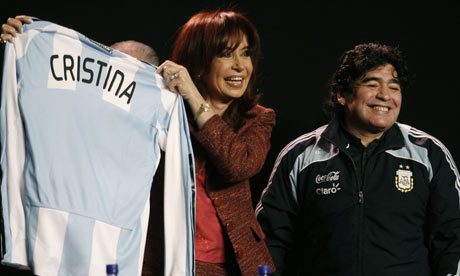
When does it become a moral imperative for the government to intervene and head of potential riots?
When it comes to football, specifically Argentinian football. Cristina Fernandez, the PM poured in $155m to head of the debt crisis of the league which had led to a delay of a week in the start of the Apertura.
She bought the TV rights so that matches could be telecast free of cost to millions after the AFA walked away from an agreement with private broadcasters that would have paid them half the money, i.e., $70m. This would have fallen short of the amount of money needed to plug the financial hole that the clubs find themselves caused by the depressed transfer market leading to less payoffs. The global financial turmoil has caused a drop off in players sales to richer overseas leagues.
“Today is a historic day for football, for the AFA, for Argentines and for the possibility of living in a more just and democratic society,’ Fernandez said.
‘It’s not good … that only those who can pay can watch football.”
A pointed observation directed at the entity that was rebuffed by the AFA, the Grupo Clarin, the TV and media conglomerate that controls the broadcast of these games though their partner TyC (Torneos y Competencias) also has a deadlock on the control and dissemination of the news business unduly influencing the political process from a right wing perspective. Yes, think Fox News, WSJ, and other Rupert Murdoch run news organizations controlling the mediascape.
The Clarin group and the center leftist Cristina Fernandez government, more specifically her husband Nestor Kirchner have engaged in a series of feuds brought on by the government’s desire to break the monopoly on the broadcast business and create smaller and more progressive news outlets. The Clarin group has in the past actively campaigned against the elections of the Kirchners with critical opinion pieces.
On March 18th this year the government introduced a media reform bill seeking to undo regulations put into place by dictator, Jorge Rafael Videla whose iron fisted rule from 1976 to 1981 led to state sponsored violence targeting thousands of students, political activists, and trade union leaders in a series of arrests, kidnappings, forced disappearances, torture, and executions. When he finally relinquished power in 1981, it is estimated that 30,000 Argentinians had “disappeared” (desaparecidos).
Maria Trigona of the CIP writes Videla “censored most of the press and implemented harsh laws to prevent opposition from being publicly expressed. Media legislation from Argentina’s dictatorship is still intact today.”
The nation’s top three stations continue to remain in the hands of major economic groups: Daniel Hadad, the right-wing media tycoon, retains Channel 9 until 2019; Clarín group will own Channel 13 until 2025; the Spanish company Telefónica will hold on to Telefé (Channel 11) until 2025.
Fernandez introducing the bill called it an important step in ensuring a diversity of opinion by increasing the presence of community based and non for profit media groups. The reform also includes airing football matches on free channels. It is no wonder that Grupo Clarin is in vehement opposition to these changes.
“All Argentines have the right to expression and to cultural assets that can’t be monopolized by one sector or one company.”
However, these words are self serving because these monopolistic licenses were actually approved by her husband, Nestor Kirchner while in power, reflecting a time when Grupo Clarin enjoyed a cozy and comfortable relationship with the government. Clarin was bailed out of bankruptcy in 2002 when the Duhalde government intervened to stave of creditors which continued under Kirchner. It turned sour last year after the media coverage over the government’s proposal of taxing farmer’s profits and the subsequent revolt that followed turned critical. Clarin called Fernandez “imperious” and “out of touch”.
The solid support that she once enjoyed began to crumble and in a recent state election held in June, the JP lost the majority in the lower house of Congress, while Kirchner was humiliated by coming second in the election for deputies, including losing Buenos Aires, their traditional base of support. Most political analysts now believe that these losses could prove fatal to Christina Fernandez chances of being re-elected in the 2011 elections. Saving the Apertura is viewed as a populist measure intent on rejuvenating the party.
The person charged with the last minute volte face in negotiations with the TyC, Julio Grondona, the AFA president was also responsible for selling TV rights to private operators for profit in 1991. The pay per view contract was used to enrich companies like Direct TV and Grupo Clarin while the TV money was used to pull the league out of financial dire straits.
“When I started my tenure 30 years ago, the only channel to broadcast football was Channel 7; and after everything that has happened since, here we are again, back at Channel 7”
The TyC president, Marcelo Bombau claims that Mr Kirchner persuaded Mr Grondona to switch the contract at a late-night meeting, and says he will sue the association. Officials later denied that the meeting took place.
Diego Maradona has waded into the controversy with his support of the media bill.
“This law would allow everyone in Argentina to watch big sports events for free,” said Maradona.
Meanwhile another Boca figure, arch conservative Mauricio Macri, who is Buenos Aires mayor and a former president of the club is now leading the charge against the Kirchner government and is the public face of the opposition.
Clarin has lost this one on the pitch. But behind it lie the many visceral connections between Argentina’s politics and media with its national passion. It neatly encapsulates the term “political football.”